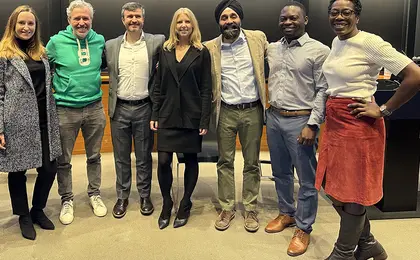An Education in Growing Your Impact
A team of EMBA students and alumni have been working to help refugees displaced in Ukraine and elsewhere. Now they are expanding their ambitions. Ivan Volodchenkov ’23 explains.

In 2022, a group of Yale SOM EMBA students teamed up to help refugees displaced from Ukraine with food and shelter. What began as an ad hoc effort evolved into a global digital platform called The Path Forward, which connects refugees and the resources they desperately need. Then, with new perspectives gained from classmates from around the world and their MBA coursework, the team turned to a an even larger project: supporting the most vulnerable while addressing the labor shortage strangling developed economies.
The Path Forward has been a long journey that started with my classmate Ali Platon’s family’s efforts to help refugees with food on the Romanian side of the border. A few months later, we were accompanied by Ella Archibald ’22 and Bart McDonough ’23 on a trip to support a larger group of refugees with food and other immediate needs. This is when we realized how big and painful the refugee crisis was.
An eye-opening question-statement about equity from Meshie Knight ’23 further highlighted this issue. Meshie pointed out, rightly, that the most vulnerable people experience all societal problems amplified. This was when we first attempted to support Afghan refugees and saw the unfairness firsthand. If it weren’t for Puneet Chhabra ’24, I would never have learned about the devastating effect of the partition of India. Kelsey Overby ’23 helped us understand that military crises, though they might be the most horrible, are not the only ones; natural catastrophes are equally devastating and will only be amplified with climate change. When Jide Okandeji ’23 joined our team, I realized that together, we had a peer from almost every continent with incredible knowledge and history.

Over several months, we learned about the concept of global mobility and were reminded about the universal value of human life. We delved into the rabbit hole of legal paperwork and observed the crisis from the perspective of macroeconomics. I feel like I have gained a second degree in parallel with an EMBA. However, it was our EMBA program that was the key to discovering the greatest impact that we can make. While all of us participated in providing support to refugees through fundraising, coaching refugees, and/or helping with visa paperwork—and we should not underestimate the impact of these efforts on individual lives and their families—how much could a few people do in the face of a global crisis impacting millions of people? What we learned at SOM and from each other helped us to look for a potential solution.
Through our classes at Yale, we learned about the energy security concept. The U.S. needs recurring supplies of fuel to keep the economy going. If a supply shock happens, whether on a price or a quantity side, the economy experiences inflation or stagnation. If we look at immigration through the lens of economists and see it as a production factor, then we can apply a similar concept and arrive at an interesting conclusion. Rather than looking at the refugee problem in isolation, we are now looking at the sustainable trajectory of economic development, which requires a tremendous number of factors to be in dynamic balance, including labor supply and demand.
Now, hiring has become tough, and wage growth is decreasing margins. We know that part of the current inflation is caused by high labor costs resulting from labor shortages due to recent changes in immigration policies and deaths from COVID. But perhaps we did not see the forest for the trees? To put it simply, annual GDP growth of 2% requires 2% more labor every year. This trend, combined with the aging population, is a strong headwind for the economy.
One cannot simply deliver crude oil to the energy grid and expect it to produce electricity; the oil must be processed. Similarly, solving our labor shortage is not just about bringing in a greater number of immigrants; it is about integrating them into our economy—through coaching and education, for example.
This work is not just about advocating for immigration but about finding a way to support the most vulnerable while aligning with economic benefits. Otherwise, refugees are introduced to American hardships, becoming easy targets for exploitation by shady practices, just as oil spills create environmental issues instead of energy in our homes. But we have hope that our initiative combines the best for business and society by working towards a sustainable path forward for all.
